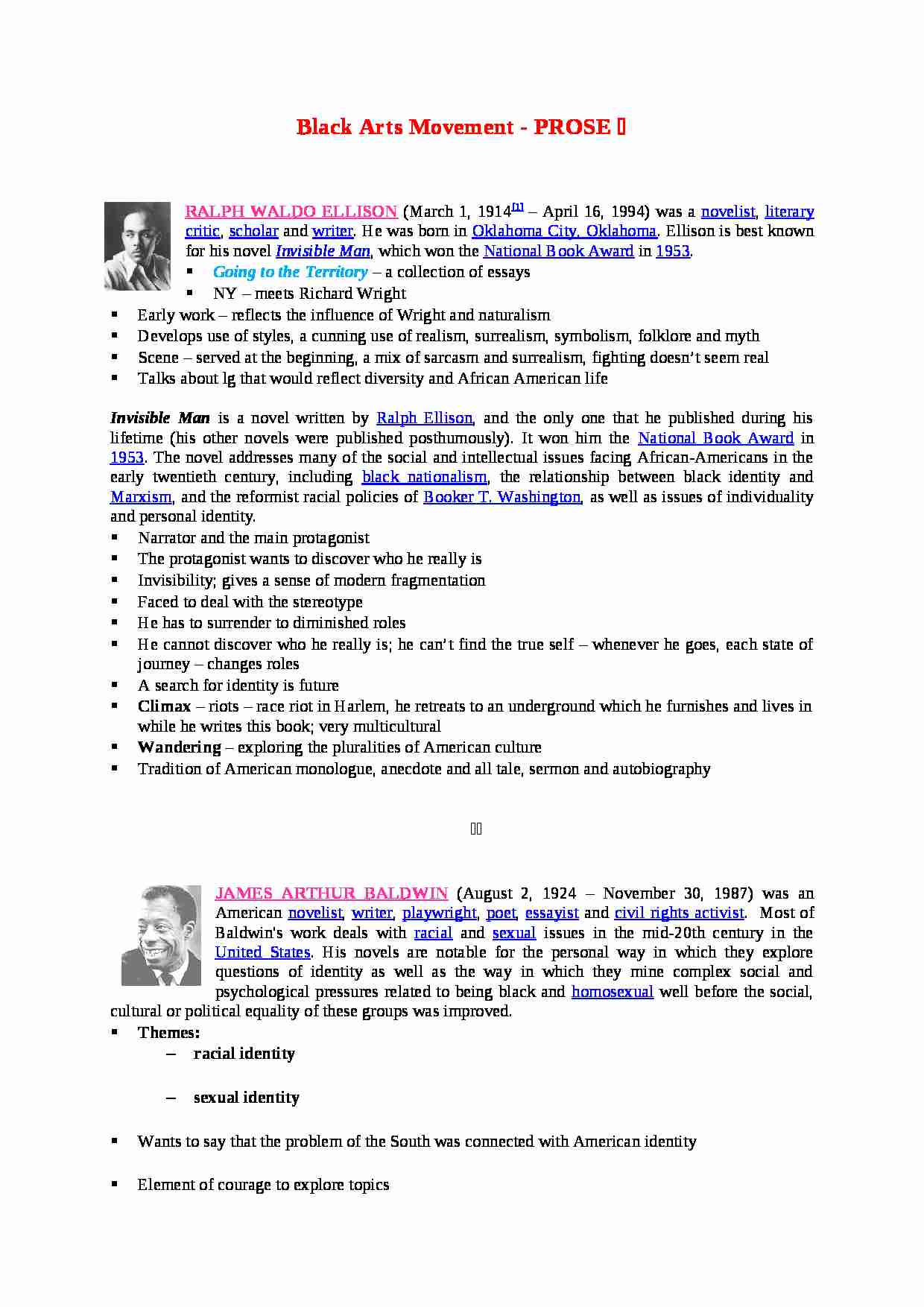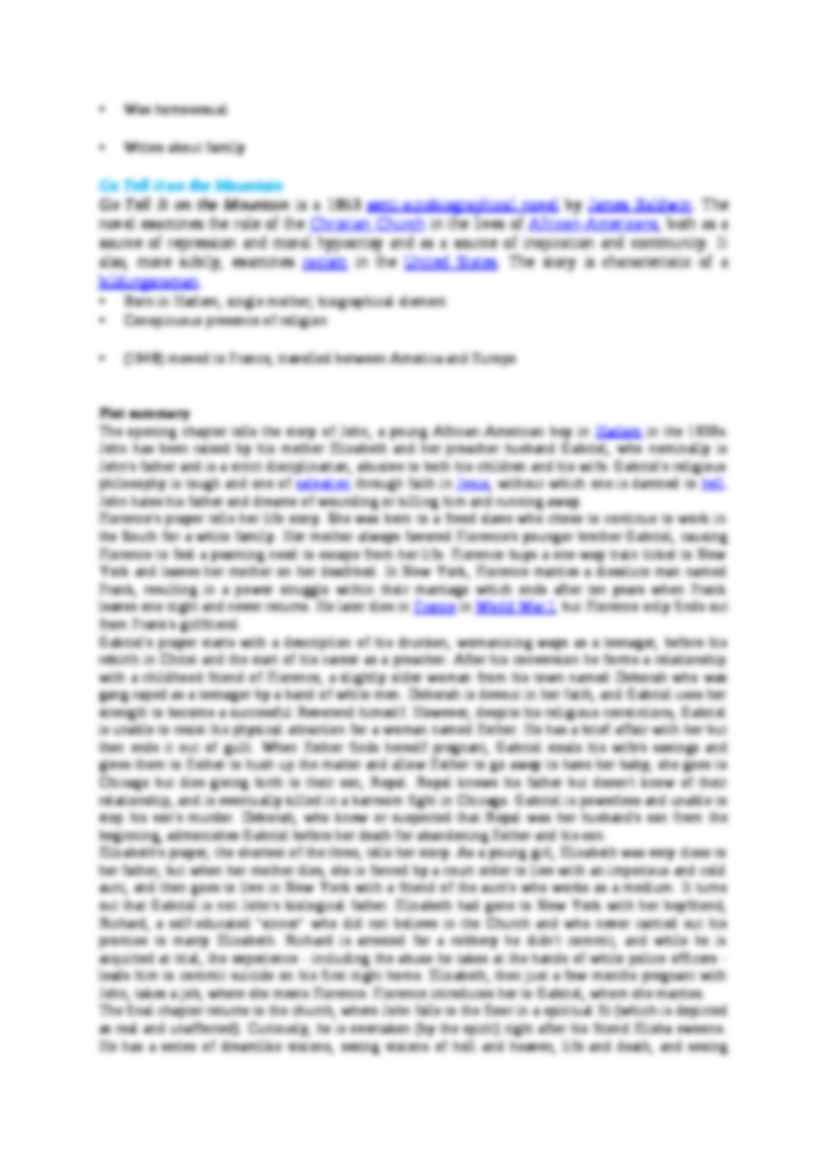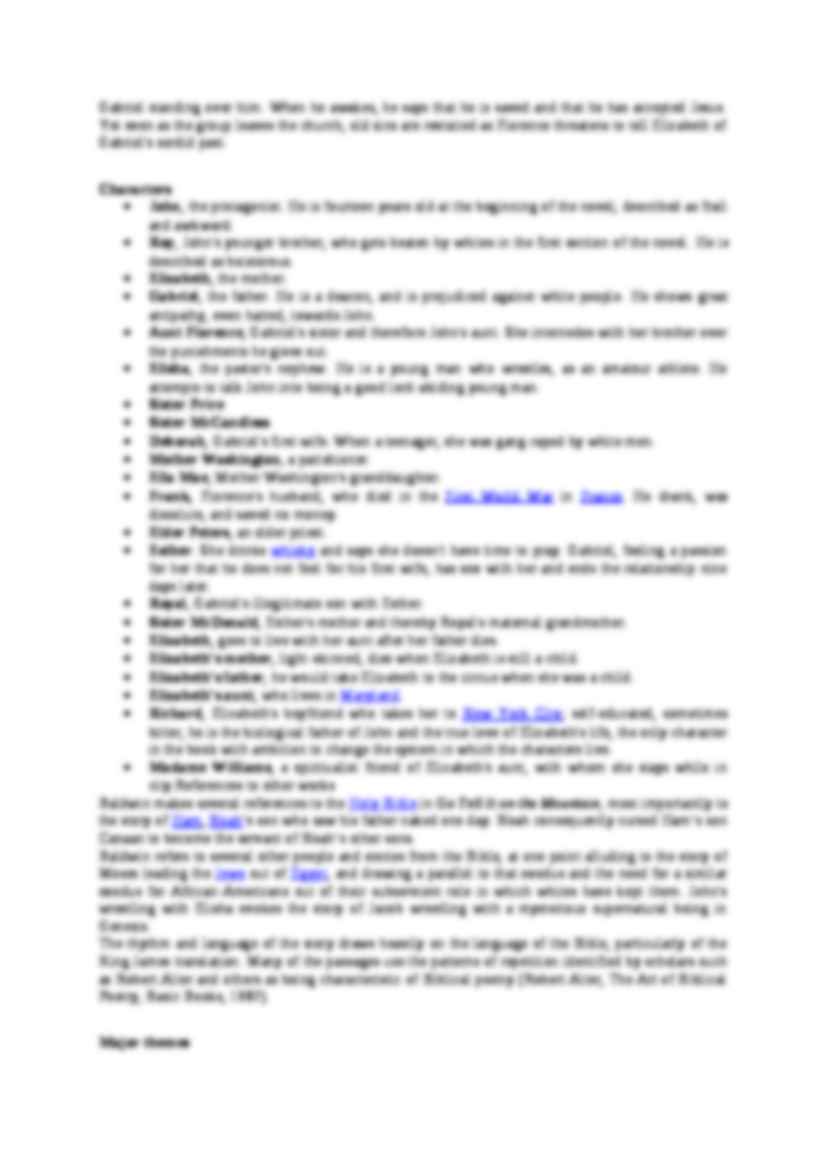


Fragment notatki:
Black Arts Movement - PROSE Ralph Waldo Ellison (March 1, 1914[1] - April 16, 1994) was a novelist, literary critic, scholar and writer. He was born in Oklahoma City, Oklahoma. Ellison is best known for his novel Invisible Man, which won the National Book Award in 1953.
Going to the Territory - a collection of essays
NY - meets Richard Wright
Early work - reflects the influence of Wright and naturalism
Develops use of styles, a cunning use of realism, surrealism, symbolism, folklore and myth
Scene - served at the beginning, a mix of sarcasm and surrealism, fighting doesn't seem real
Talks about lg that would reflect diversity and African American life
Invisible Man is a novel written by Ralph Ellison, and the only one that he published during his lifetime (his other novels were published posthumously). It won him the National Book Award in 1953. The novel addresses many of the social and intellectual issues facing African-Americans in the early twentieth century, including black nationalism, the relationship between black identity and Marxism, and the reformist racial policies of Booker T. Washington, as well as issues of individuality and personal identity.
Narrator and the main protagonist
The protagonist wants to discover who he really is
Invisibility; gives a sense of modern fragmentation
Faced to deal with the stereotype
He has to surrender to diminished roles
He cannot discover who he really is; he can't find the true self - whenever he goes, each state of journey - changes roles
A search for identity is future
Climax - riots - race riot in Harlem, he retreats to an underground which he furnishes and lives in while he writes this book; very multicultural
Wandering - exploring the pluralities of American culture
Tradition of American monologue, anecdote and all tale, sermon and autobiography
James Arthur Baldwin (August 2, 1924 - November 30, 1987) was an American novelist, writer, playwright, poet, essayist and civil rights activist. Most of Baldwin's work deals with racial and sexual issues in the mid-20th century in the United States. His novels are notable for the personal way in which they explore questions of identity as well as the way in which they mine complex social and psychological pressures related to being black and homosexual well before the social, cultural or political equality of these groups was improved. Themes: racial identity
sexual identity
Wants to say that the problem of the South was connected with American identity
Element of courage to explore topics
(…)
… manuscript's antisemitic material significantly influenced the ideological tone of the Autobiography, increasing its commercial success and popularity while creating a somewhat distorted view of Malcolm X's public figure.
Martin Luther King (1929-68) the most important leader of the US civil rights movement. King was an African-American Baptist minister who led a series of peaceful campaigns against…
…- ) has continued his work. His birthday, 15 January, is an official holiday in many states.
"I Have a Dream" is a seventeen minute public speech by Martin Luther King, Jr., in which he called for racial equality and an end to discrimination. King's delivery of the speech on August 28, 1963, from the steps of the Lincoln Memorial during the March on Washington for Jobs and Freedom, was a defining moment…
… to say that the problem of the South was connected with American identity
Element of courage to explore topics
Was homosexual
Writes about family
Go Tell it on the Mountain
Go Tell It on the Mountain is a 1953 semi-autobiographical novel by James Baldwin. The novel examines the role of the Christian Church in the lives of African-Americans, both as a source of repression and moral hypocrisy and as…
… a relationship with a childhood friend of Florence, a slightly older woman from his town named Deborah who was gang-raped as a teenager by a band of white men. Deborah is devout in her faith, and Gabriel uses her strength to become a successful Reverend himself. However, despite his religious convictions, Gabriel is unable to resist his physical attraction for a woman named Esther. He has a brief affair with…
… cold aunt, and then goes to live in New York with a friend of the aunt's who works as a medium. It turns out that Gabriel is not John's biological father. Elizabeth had gone to New York with her boyfriend, Richard, a self-educated "sinner" who did not believe in the Church and who never carried out his promise to marry Elizabeth. Richard is arrested for a robbery he didn't commit, and while he is…
… men.
Mother Washington, a parishioner.
Ella Mae, Mother Washington's granddaughter.
Frank, Florence's husband, who died in the First World War in France. He drank, was dissolute, and saved no money.
Elder Peters, an elder priest.
Esther. She drinks whisky and says she doesn't have time to pray. Gabriel, feeling a passion for her that he does not feel for his first wife, has sex with her and ends the…
…, a blond American. The protagonist. His mother died when he was five years old.
Hella, David's girlfriend. They met in a bar in Saint Germain des Pres. She is from Minneapolis and moved to Paris to study painting, until she threw in the towel and met David by serendipity.
Giovanni, an Italian boy, who left his village after his girlfriend gave birth to a dead child. He works as a waiter in Guillaume's gay…
... zobacz całą notatkę

Komentarze użytkowników (0)